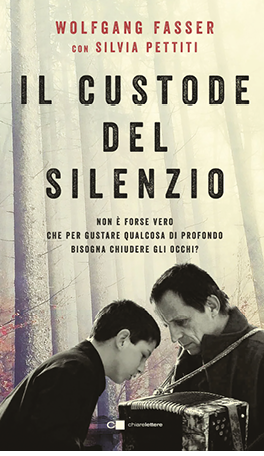Wolfgang Fasser has had many experiences. Blind due to a hereditary disease, he is a musician and a physiotherapist. In Quorle, in the Tuscan Apennines, he founded a sound therapy center for children with disabilities, and the Fraternità cristiana di Romena, an Italian Catholic lay movement. He spends a few months every year as a hospital physiotherapist in Lesotho, in southern Africa. He also plays the saxophone, specializing in Klezmer (the music of eastern European Jews). He has starred in award-winning documentaries such as “In the Garden of Sounds” by director Nicola Bellucci, and is the author of “Il custode del silenzio’’ (“The guardian of silence”) (published by Chiarelettere, written with Silvia Pettiti) .
What can the experience of silence teach us?
Silence doesn’t teach: it lets me discover and rediscover. For example, discover life with my senses, extended time, healthy emptiness. By experiencing silence, we find ourselves, i.e., we discover how to lead our interior and exterior life. There’s silence for the ears, but also one for the eyes and for working hands, and there’s silence for our daily habits. These more profound silences bear a precious gift: an invitation for a journey to liberation. Liberation from all the superfluous things we believe in, from negative influences, opening a space that life can enter. And there’s more: an invitation for liberation from yourself, from everything expressed by “I am” and “I want.” All the non-freedoms that choke our life, deriving from egocentric-egoistic development. This journey frees us to receive existence, the infinite, and the divine.
Can not seeing, living without looking at appearances, encourage closer contact with oneself and with others?
I explored this subject in a lengthy dialog with Silvia Pettiti. In our book “”Il custode del silenzio,’’ this subject is entitled ”Il sipario verso l’esteriorità’’ (“The curtain toward appearances”). Obviously, knowing how a blind person lives is no guarantee of a life in which the senses are more highly developed, one with greater spiritual depth. But neither is being sighted automatically a limit to spiritual growth. Knowing how to live profoundly, without separating spiritual life from everyday life, allows us all to grow and provides a good basis for both situations.

What brought you to write about yourself?
Maurizio Donati, without my knowledge, observed the results of my work for years, and contacted me to write a book that answered the question: “What sources do I draw from to be who I am?” I found a wonderful collaborator in Silvia Pettiti, author of numerous books and biographer of Arturo Paoli.
Our society discriminates against people who are different. How can we end this mindset?
By creating a sense of community through encounters with others, learning to accept others as they are, i.e., in all their diversity, to open a dialog leading to the common good, so that we can all take part in improving the quality of life of everyone in our society. I don’t believe in welfare as an end in itself, but I know that being able to participate in social life helps us give meaning to our life as well as an important contribution to the lives of others.
You link the pleasure of silence and of solitude to the pleasure of music and of closeness to others. How can these two aspects be merged?
They shouldn’t be separated, but instead given space. There’s time for interior life and time for everyday life. Spirituality isn’t a hobby and everyday life isn’t annoying: they’re dimensions of my existence, like rooms that want to be inhabited.

.jpg)



.png)